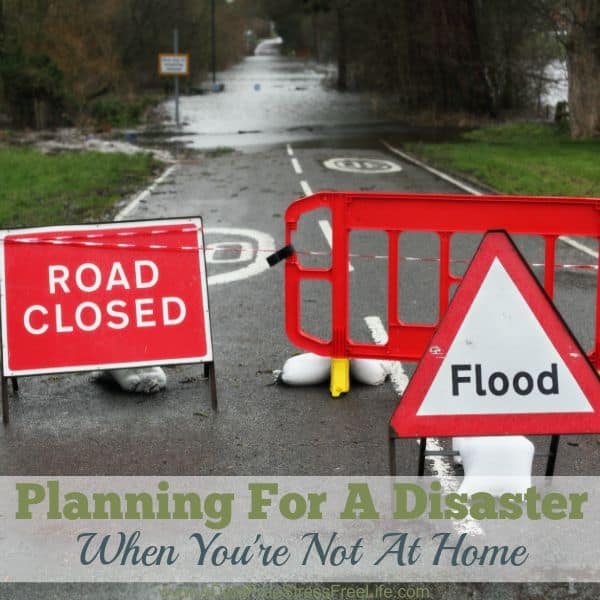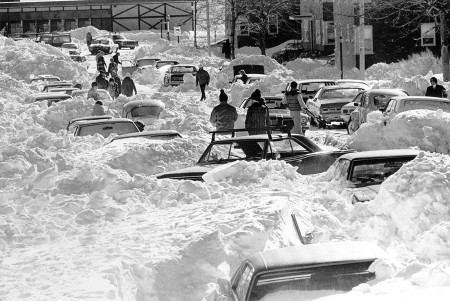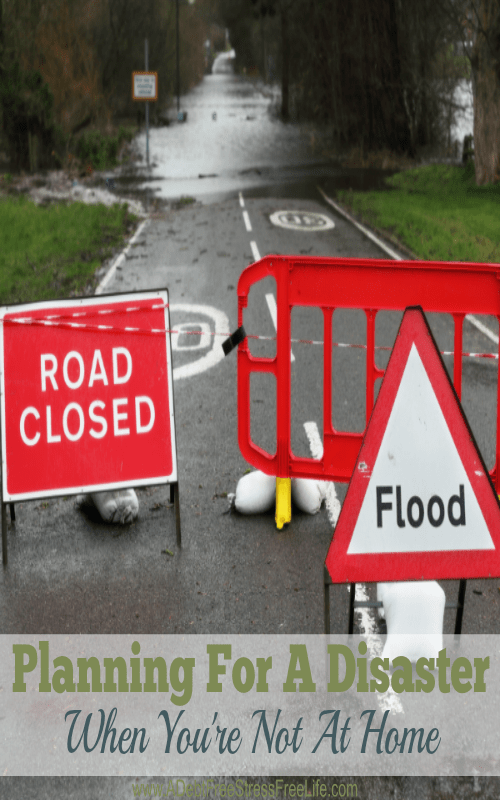A Mess Free Life may collect a share of sales or other compensation from the links on this page.
Throughout the month of September, I’ve been highlighting some of the most important things you need to know when preparing for a man-made or natural disaster.
We’ve covered creating your personalized family plan, water storage, and food storage. Today, I’d like to explore preparing a plan for when your family is away from home.

Planning for A Disaster When You’re Not At Home
Often a disaster strikes when you’re not at home. Maybe a thunderstorm turns into a tornado or flash flood, or an earthquake happens when you least expect it.

**FILE**Residents of Farragut Road in South Boston are seen in this 1978 File Photo digging their cars out from snowdrifts following the blizzard that struck the New England area in 1978. The super storm that buried Boston in 27 inches of snow caused extensive damage and was responsible for at least 29 deaths.(AP Photo)
During the Blizzard of 1978, many people lost their lives because they didn’t shelter in place at work or school, and headed onto the highways only to be overcome with wind, snow and snow drifts. They lacked adequate supplies in their cars to keep them warm and hydrated and perished as a result.
Since you can’t predict where you will be when a disaster strikes, it is important to have plans and supplies for the locations you and your family go to regularly. Planning ahead will ensure that you and your family will know what to do and have the supplies you need to be safe wherever you are.
Examples of locations to consider and plan for include:
- Home
- Workplace
- Vehicles – Have a plan for traveling between work and home, and other commonly visited locations, in the case of an emergency.
- Regular methods of transportation such as trains, urban commuter transit
- School
- Places of Worship
- Sports arenas and playing fields
School and Workplace
You’ve got your plan done right? Well have you ever considered what the emergency plan might be at your child’s school or daycare? What about were you work, or send your elderly parent each day? Does your neighborhood or apartment building have a site-specific emergency plan?
If you don’t know the answer to these questions, ask about the plans where your family spends the most time: work, school and other places that are frequented like after school programs and extracurricular activity centers.
If none exist, consider volunteering to help develop one. You will be better prepared to reunite safely your family and loved ones during an emergency if you think ahead and communicate with others in advance.
Questions for Schools & Daycare
If you are a parent or guardian of an elderly or disabled adult, make sure schools and daycare providers have emergency response plans.
- Ask how they will communicate with families during a crisis.
- Ask if they store adequate food, water, and other essential supplies.
- Find out if they are prepared to “shelter-in-place” if need be, and where they plan to go if they must get away.
Questions for the Workplace
If you are an employer, make sure your workplace has a building evacuation plan that is regularly practiced.
Think about what to do if your employees can’t go home. Do you have supplies on hand to care for all your employees?
Encourage your employees to create their 3-day emergency kit and keep it in a safe place at the work site or in their personal vehicle. Work together as a team to ensure the safety of everyone that works together in one location.
Emergency Car Kit
Often you’ll be away from home when a disaster or emergency occurs. Having a car emergency kit could mean the difference between life and death in certain situations. Consider putting together a kit for your car. Here’s what’s recommended:
If possible, keep these items in waterproof containers. Prepare for an emergency by having these items organized and easily accessible.
-
- Extra fuel (stored in approved gas cans); always keep your gas tank 1/2 full
- Water (bottled, boxed, or bagged)
- Food (if canned supply a can opener)
- Battery booster cables
- Tire chains
- Roadmaps
- First aid kit
- Toolkit (car tools, knife, and misc tools to turn off utilities)
- Sturdy rope or chain
- Shovel
- Emergency flashlight (requires no batteries)
- Warm blanket or sleeping bag
- Bright colored rain gear (poncho)
- Hand warmers
- Important documents (personal identification, insurance, emergency contacts, etc.)
Resources to Help
- To help educated your child and test their knowledge of emergency preparedness visit: Ready.Gov/Kids
- For information on how you can work together in your community to be prepared visit: Ready.Gov/Citizen-Corps
- For businesses that need information on how to prepare their work site to visit: Ready.Gov/Business
- For more information on evacuating your family in an emergency visit: Ready.Gov/Evacuating Your Family
- To develop a commuter evacuation plan visit: FEMA.GOV/Commuter Plan
Using the resources provided will get you started on developing the plan you’ll use if you or a loved one is away from home and a disaster strikes.
Make your plans today and ensure your family is safe when a disaster strikes.



